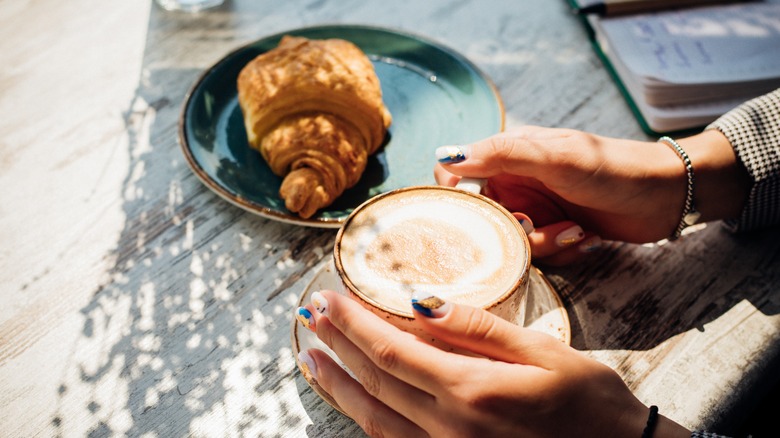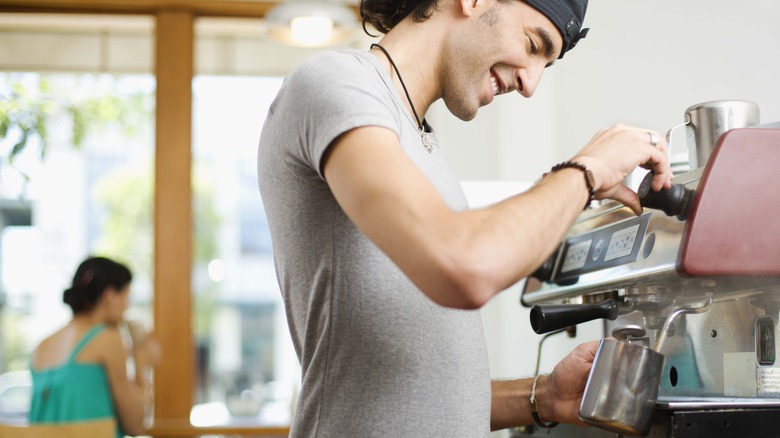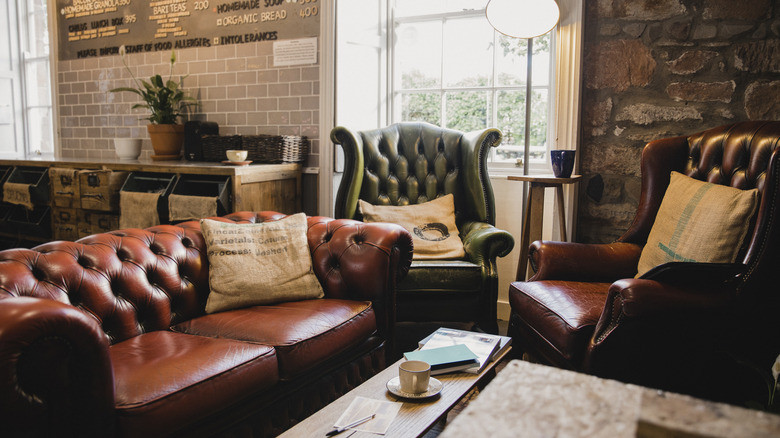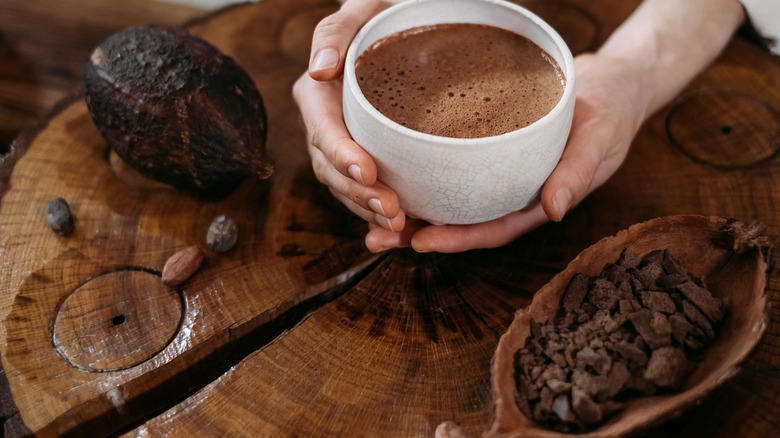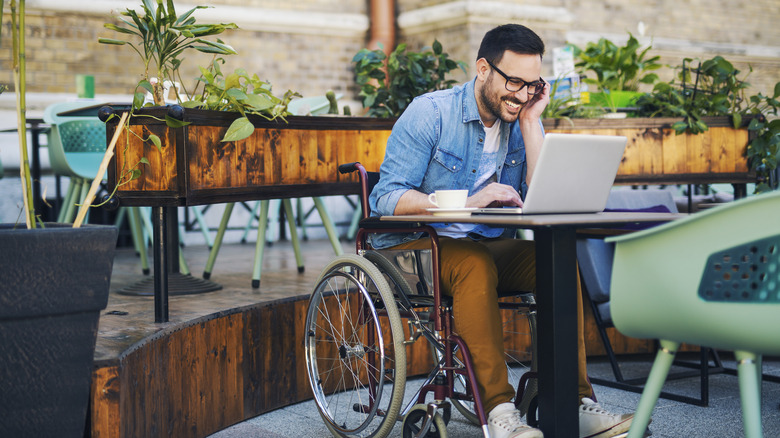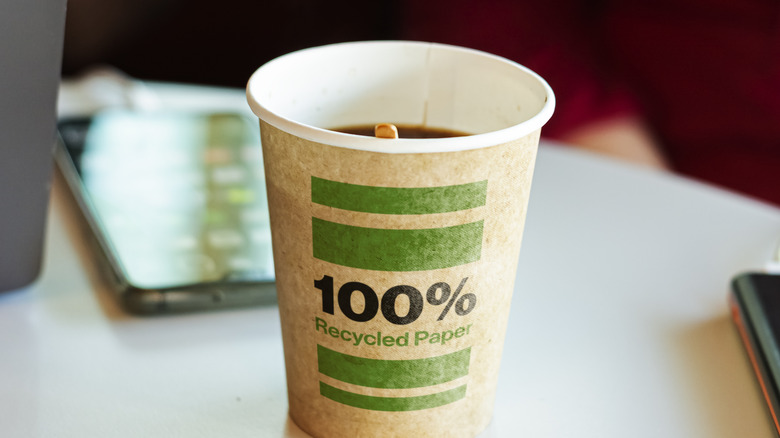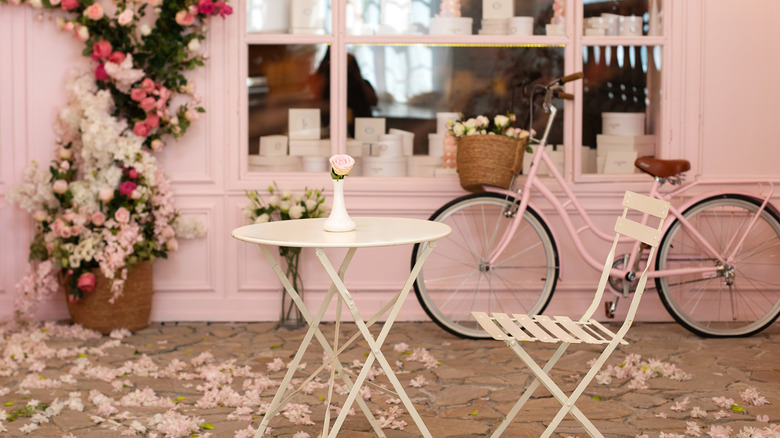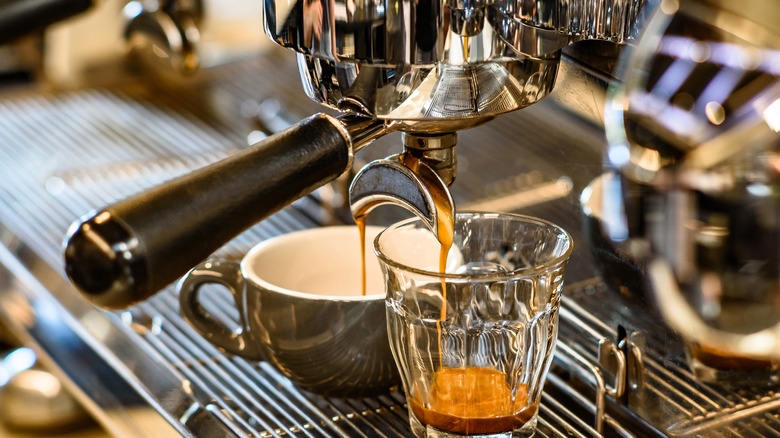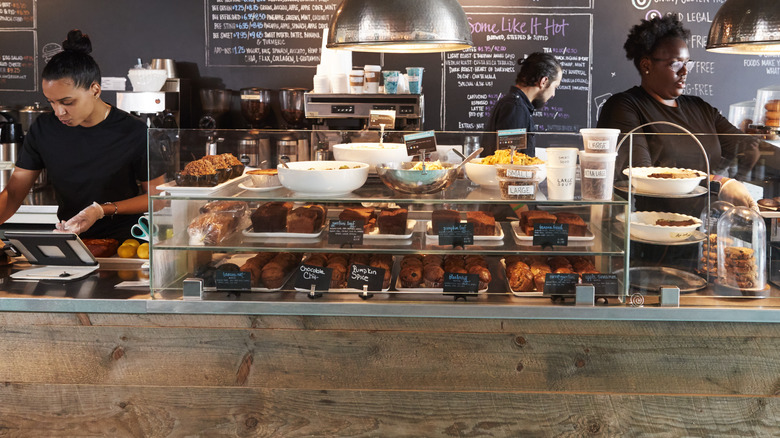11 Telltale Signs Of A Quality Coffee Shop
Some people consider coffee close to ambrosia, the nectar of the gods. A proper day of work doesn't start until that daily dose of caffeine kicks in to jumpstart the day. For our brains, like any vehicle in need of fuel, the choice of fueling station is as important as the fuel itself. In coffee's case, the importance of cafés can't be understated.
Most recognize that the word café stems from the French café, but, according to Britannica, the word goes back to Istanbul, Turkey — then known as Constantinople, where it comes from the word kahve, meaning "coffee." From there, coffee and cafés caught on across Europe by the 17th century. From then onward, cafés became meeting places for political, artistic, and intellectual discussion. According to Culture Trip, the Brits brought café culture with them to "The New World," and Americans have kept the culture alive ever since.
In 2019, the Business of Business recorded the average American spends $1100 annually on coffee at one of 35,616 coffee shops across the country. That adds up to $45.4 billion in market value. In 2022, according to Statista, the number of coffee shops in the U.S. has grown to 38,411. So, chances are that you've got several favorite cafés nearby. People obviously love their coffee, but what makes a quality coffee shop, and why does café coffee always taste better? The secret's in the shop.
Professional baristas set the scene
Let's start with the obvious and look at the people who make our coffee at the café. What makes a great barista, and why are they important to a quality coffee house? The Indy Coffee Guide spoke with a few expert baristas who pointed out qualities like friendly communication with your regulars, knowledge of and a willingness to learn more about coffee, an ability to multitask, and tidy organizational skills as some of the most necessary qualities of a great barista. If your barista understands the difference between first, second, and third-wave coffee and how that defines coffee history, that's also a good sign.
As the old "Cheers" opener says, a place where "everybody knows your name" is a selling point for any customer. And obviously, the quality of coffee is just as important. Along with mastery over brewing everything from pour-overs to cold brews — and the ability to pull a proper espresso beverage — bringing up tiny details of past conversations you've shared, such as a name or details of a vacation, is a bonus that makes customers feel noticed. Even the ability to frame standard service questions thoughtfully shows an authentic interest in customer experience beyond inspiring the most Instagrammable latte art.
Simply put, customer service in the form of a skilled, friendly, and knowledgeable barista is a good sign of a quality coffee shop.
A cozy place to pass time
It's maybe needless to say, but nobody wants to stay somewhere they feel uncomfortable. In the age of remote work, it's never been more important than now for a coffee shop to exude warmth, whether talking about its staff or its ambiance. So when considering the qualities of the best coffee shops, coziness has to make the list for reasons besides the obvious comfort equation.
For instance, according to LinkedIn, joint research conducted by Yale and Tel Aviv University found that cozy cafés were the best spot to talk to an employer about a raise because of something called "embodied cognition" — a concept suggesting physical space can negatively or positively influence our emotional responses. Ergo, if your boss is comfy and sipping an expertly crafted cup of high-end coffee, the odds are significantly better they'll say yes to a raise or any other ideas you have to pitch.
It turns out that a comfy coffee shop can also positively impact our love lives, which is never a bad thing. Cozying up in a new café with a special someone on a cold winter's day is as fantastic and romantic of a date idea as we can suggest. Get a pro barista to go all out with a milk foam heart poured over a latte in a comfortable corner of the café and thank us later.
The coffee, of course
Naturally, the main event at a coffee shop will be the brew, and the quality of coffee on the market can certainly vary. As it turns out, coffee may also be good for health. As reported by the New York Times, a wide range of research suggests moderate drinking — no more than 3 to 5 cups per day — lowered the possibility of heart attack and stroke. It also lowered the risk for illnesses like Parkinson's or Type 2 diabetes. Filtered drip coffee found at cafés is also better than something made at home, in, say, a French press.
All that is great, but the way to recognize the difference between a café that knows how to make good coffee and one that doesn't is to ask questions and use your sense. A bitter cup missing a fresh brewed aroma and matching taste indicates a place making bad coffee. However, if the barista knows where the coffee is sourced and what to expect in terms of taste, they're far less likely to make a bad cup.
The practice of emphasizing higher quality, sustainable coffee beans, along with a knowledge of how factors like age, roast, and types of coffee impact the flavor profile, is a reason why java at a decent coffee shop normally tastes better than what is made at home.
Community is a good sign
Perhaps as important as the people behind the coffee bar are the other patrons inside the café. Some cafés have moved beyond the role of just a local business and have also considered ways to integrate themselves into the community it serves. Using Indianapolis as a case study for this idea, Barista Magazine points to cafés in the Midwest adopting barista and poetry workshops, third-wave coffee collaborations with local breweries, latte art competitions, open-mic nights, weekend sing-alongs for kids as a way to foster community. Meanwhile, Remezcla shines a spotlight on Café Santo in Los Angeles, California. In this space, local musicians commune with patrons, and cultural events like mezcal and chocolate pairings share space with public car shows.
If all this talk of community at a café makes you feel warm and fuzzy, there's a good reason. A Harvard University study found that 36% of all Americans experience severe loneliness; however, a 2010 meta-review revealed that having strong social networks can raise life expectancy by half. In other words, being in a space where you feel like part of a community has a positive impact on physical, emotional, and mental health. So when someone in the coffee shop asks another patron to watch their laptop while they order another espresso, that's actually helping build community and is a sign of a café people want to be at.
Cleanliness is next to ...
The cleanliness of a café says a lot about any space. Take, for example, a Newsweek report, which covered the story of an ex-employee (of a widely known first-wave coffee chain) whose TikTok videos exposed gnarly conditions at the café they worked out of. Dirty equipment, soiled bathroom floors, long expired dairy creamers, and proof of a possible cockroach infestation would send anyone running for the door. The posts went viral to the tune of 4.5 million views. As bad as this is for unsuspecting patrons, the unhygienic status of an establishment is a safety issue for everyone — including employees.
According to The City, the uncleanliness of one particular Manhattan-based Starbucks led to a seven-week employee strike that only ended after an agreement to thoroughly clean equipment and to cover the cost of employees' home bed bug inspections. Going back to the first sign of a quality coffee shop, any barista deserves to be safe in their workspace. If the barista pouring the lattes is worried about bringing cockroaches or bed bugs home with them at the end of their shift because of the space, it's a good bet that it will affect their customer service level too. If a customer brings pests home, they aren't coming back either. So a clean coffee shop is a fair sign of a quality coffee shop on several levels.
Inclusivity is a must
The importance of accessible, inclusive spaces for everyone can't be overstated. Common barriers to access for disabled patrons include a lack of wheelchair-accessible entranceways and restrooms, high counters, tables and seating, and menus that don't consider vision impairment. Not are these barriers unfair, inequitable, and inconsiderate, but they're also not a very smart way to run a business.
According to Twin Cities, shops like Flava Coffee & Café and Makwa Coffee — Black, Indigenous, and women-owned cafés in St. Paul, Minnesota — are special because of the connection to cultural diversity and the safe spaces they provide for underrepresented communities in coffee culture. The addition of regional coffee styles —
like Brazilian cafézinho, Vietnamese ube, or café de olla, a cinnamon-laced java from Mexico — a coffee house can honor the places and cultures which supply beans to the world.
An inclusive café with a unique take on coffee is something to be celebrated, as it is a place where everyone, regardless of cultural background or physical ability, can feel welcome. As such, this is definitely a sign of a quality, considerate coffee shop any person would want to be in.
Sustainability is principle
The Guardian explains how the VTT Technical Research Centre of Finland is working on coffee made from cell cultures instead of coffee beans to help curb the detrimental carbon footprint of coffee production. It could potentially provide a beneficial workaround for the damaging effects of climate disasters on coffee bean cultivation and businesses in developing nations.
Cellular coffee aside, a conscientious café considers sustainability, especially in the shadow of climate change. According to Barista Magazine, some cafés across the U.S. are employing energy and waste-limiting initiatives like composting, paper straws, reusable coffee cups to help eliminate landfill, and renewable solar energy to power their establishments. As pointed out by FSR Magazine, customers are aligning their personal ethics with their spending habits, and the way a café contributes to the world locally and globally impacts where they spend their money.
Bottomline, climate accountability through sustainable practices is something more people demand from themselves and the businesses they support. A coffee shop that respects the quality of its planet should respect the quality of its coffee, space, and patrons.
The ambiance sets a world apart
As per the NewScientist, thanks to something called "the audience effect," people tend to experience a better workflow in places with a background level of ambient noise. So much so that apps like "Coffitivity" exist to replicate the soundtrack of your favorite café from anywhere. The ambiance of a coffee shop can make or break it, and that includes visual stimulation. In a BBC article, the assistant professor of organizational theory and strategy at Carnegie Mellon University's Tepper School of Business, Sunkee Lee, explained that visually stimulating environments like cafés heavily influence creative thinking.
When we talk about visual stimulation, concepts like biophilic design are perfect examples. According to the World Coffee Portal, biophilia from ancient Greek means "the love of living things." It alludes to the convergence of nature, open space, natural light, and elements like running water in the design of a space. Of course, finding this sort of aura in a local coffee shop isn't always possible. Still, even a few of the aforementioned elements are positive if the goal is to enjoy a wonderful cup of coffee while working on the next great American novel.
If the type of coffee cup you drink from matters, then even the café's mug choice can provide that perfect feeling of being in your living room somewhere else. Either way, the right atmosphere is essential to a quality coffee shop experience.
Equipment makes a difference
A fabulous barista is a good thing, but a fabulous barista with outstanding equipment is a craftsperson. The U.S. Chamber of Commerce advises coffee shop businesses to start with the basics, like espresso machines, drip stations, grinders, water filtration systems, proper refrigeration units, and commercial sinks with sanitizers. This stuff seems like a given, but a real professional barista will have other tools at their disposal. This list includes tools like bean scales for exact measurements and frothing steam pitchers to help create that perfect milk foam masterpiece.
Even a chain like Starbucks has figured out that the right equipment can affect the public's perception of quality. That's why then-CEO Howard Schultz acquired the Coffee Equipment Company of Seattle to get his hands on an ultra-fancy coffee machine, the Clover roaster. Just as a mechanic needs their toolbox to fix an engine, a barista with all the right tools has the ability to fix you a quality coffee.
The Wi-Fi should wow you
Living in a digital world makes wi-fi access — preferably all-day access — a requirement for any café that wants to stay in business and keep customers happy. Fast and reliable internet pairs excellently with an amazing cup of coffee. Yahoo writes that some cafés, like New York City's Isle of Us, are going even further — combining wi-fi and wellness with lavender-infused lattes and meditation classes. As the hybrid workforce leans into remote careers, places like Isle of Us Café are making healthy wi-fi a part of the curated café experience.
Business Insider writes that many folks see wi-fi as a win-win for cafés. It's a readily available utility that expends very little energy and doesn't negatively impact the immediate environment or business. Rather, it only makes everything better. What was once considered a frill maybe a decade ago is now a necessity, and a café with no wi-fi is a no-go situation.
Of course, wi-fi speed and ease of access are important. We recommend running a test when you arrive at your café of choice to ensure that your work needs are met. If your computer has a tough time maintaining a connection with the cafés signal, or there are no readily available outlets, you may find that the café hasn't been set up for work. Finally, a good rule of thumb for camping on the wi-fi over long periods? Making regular purchases throughout the day, if your funds allow it.
The food should satisfy
Not necessarily what most people think of first when they think of cafés, good food is quickly becoming a sign of a quality coffee shop and as much a necessity for everyday customers and the remote work set as wi-fi or cold brew in summer. All-day cafés, which serve a transitioning menu from breakfast to lunch, cocktails, and an extensive non-caffeinated beverage menu, are also interesting places to work or meet friends. And they offer some unique gastronomic experiences as well.
Still, a well-assembled, tightly packed food menu allowing for minimal decisions — where all the choices are winners — is one of the things that makes a truly great coffee shop. Offering a balance of sweet and savory options is a good sign. Whether spending hours for work or just whiling the day away with a good book or company, not having to pick up and leave a comfortable café nook to grab breakfast, lunch, or a treat is a bonus for any shop experience.
